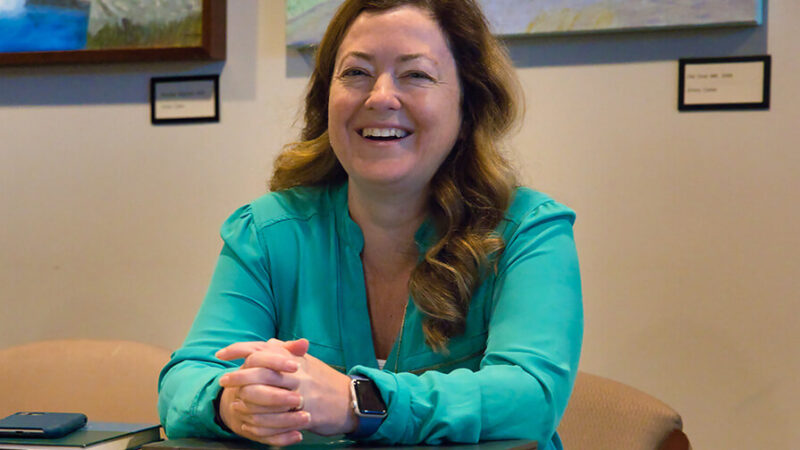Vice President Ready to Keep the Peace

Barbara Smith joined The Carter Center in Sept. 2020 as VP for Peace Programs. Her most rewarding role was director at the National Security Council under President Obama. (Photo: The Carter Center)
Barbara Smith, vice president of the Carter Center’s peace programs, says she was born to her line of work.
Her mother is from Germany and taught her the value of international perspectives. Her father was in the military and ingrained in her the importance of service.
Even so, she briefly flirted with a career in medicine at the University of Texas: “That lasted about a semester,” she said, laughing. “I don’t even like the sight of blood. That should have been my first clue.”
Instead, she found herself drawn to diplomacy and international relations, and an internship at the U.S. State Department sealed the deal.
Smith’s career prior to joining The Carter Center in September 2020 included positions at the Organization for Security and Cooperation in Europe, the U.N. High Commissioner for Refugees, The Asia Foundation, and the U.S. Agency for International Development.
She spent several years working in Sarajevo after the Bosnian war. One of her more memorable assignments involved organizing a helicopter tour for ambassadors to solicit support for the Reconstruction and Return Task Force.
But of all her pre-Center jobs, the most rewarding — and the most challenging — was serving as a director in the National Security Council under President Barack Obama.
“There’s just nothing like working at the White House,” she said. “It’s so exciting.”
During her 13 months there, Smith focused on Afghanistan and Pakistan. Her tasks included writing daily talking points for spokespeople and a weekly briefer for Obama: “You had to distill everything you thought the president should know that week into one page.”
She’d imagined being calm and composed when she met the president. But the first time she entered the Oval Office — to be on hand for Obama’s call with Afghanistan’s then-president, Hamid Karzai — her cool evaporated.
After returning to USAID and then doing some freelance consulting, Smith is once again moving in presidential circles — this time as an employee of the president whose fireside chats she remembers from childhood.
Smith had long been aware of the Carter Center’s excellent work, particularly on election observation and election standards. She’d even once met with Democracy Program Director David Carroll while in Atlanta visiting in-laws. When she learned that her former USAID colleague Paige Alexander had come on board as the Center’s CEO, her interest grew. Months later, Smith landed the job of vice president of peace programs.
“How many people get to have a title like that?” she marveled.
Despite her familiarity with the Center’s reputation, it wasn’t until she took on the role that she realized the full depth and breadth of the Center’s efforts.
“I had no idea that the peace programs had over 50 different projects and were changing lives in the way we are across Latin America and Africa and Asia.”
Smith’s priorities for the next few years include mentoring organizations in countries where the Center works so that they can play leading roles in their fields. She points to the Democracy Program’s work with an Ethiopian fact-checking group as one example of this.
Another priority is finding more opportunities for the Center’s peace and health programs to work together in the way they’ve begun to do in Mali — where conflict resolution work makes it easier to undertake health initiatives, and health initiatives serve as incentives to keep the peace.
Working to build a more peaceful world isn’t easy.
Since Smith joined the Center, Afghanistan has fallen to the Taliban; Myanmar, Mali, and Sudan have suffered coups, the U.S. capitol was stormed by rioters, and Russia has invaded Ukraine.
“It does all get to be too much sometimes,” Smith admitted. “But then I think about Bosnia and Herzegovina, which, after a brutal civil war that saw neighbors fighting neighbors, now has had a democracy, albeit a transitional one, for 20 years. Or the situation in East Timor, another country on which I worked, that is still rated as a free democracy many years after the conflict there. There are success stories, and that’s what you have to focus on or else you’ll get lost in discouragement.”
Also keeping her going are her Carter Center colleagues.
“I’m so inspired by their passion and their commitment to the people and places where we work,” she said. “It all connects to that sense of service my father ingrained in me.”
Related Resources
Global Impact Starts with You
Your support sustains the Carter Center's mission of waging peace, fighting disease, and building hope around the world.
